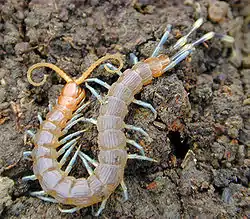百足
Chinese
| hundred | foot; to be sufficient | ||
|---|---|---|---|
| simp. and trad. (百足) |
百 | 足 | |
Pronunciation
Synonyms
- (centipede):
Japanese
Etymology 1
| Kanji in this term | |
|---|---|
| 百 | 足 |
| Grade: 1 | Grade: 1 |
| Irregular | |
From Old Japanese, of unknown derivation; some theories include:
- a compound of 向かい (mukai, “facing”, the 連用形 (ren'yōkei, “continuative or stem form”) of verb 向かう (mukau, “to face”)) + 手 (te, “hand”), as the centipede's feet come in facing pairs
- a compound of 六 (mu, “six”) + 十 (ka, “ten”, unusual reading; compare the ga in 五十嵐 (igarashi)) + 手 (te, “hand”), literally "sixty hands"; centipedes have more or less than one hundred legs
- starting as a compound of 百 (momo, “hundred”) + が (ga, ancient possessive particle) + 手 (te, “hand”), shifting phonetically: /momo ɡa te/ → /mukade/
While the latter two theories seem plausible semantically, the devoicing of ga to ka is quite unusual.
Pronunciation
Noun
百足 (hiragana むかで, katakana ムカデ, rōmaji mukade) (standard)
(alternative reading hiragana むかぜ, romaji mukaze) (Kagoshima dialect)
Usage notes
As with many terms that name organisms, this term is often spelled in katakana, especially in biological contexts, as ムカデ.
Etymology 2
| Kanji in this term | |
|---|---|
| 百 | 足 |
| ひゃく Grade: 1 |
そく Grade: 1 |
| on’yomi | |
From Middle Chinese 百足 (MC pˠæk̚ t͡sɨok̚).
Usage notes
The mukade reading is much more common.
References
This article is issued from Wiktionary. The text is licensed under Creative Commons - Attribution - Sharealike. Additional terms may apply for the media files.
